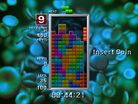Tetris The Grand Master: Difference between revisions
*>Colour thief |
|||
| Line 14: | Line 14: | ||
'''''Tetris: The Grand Master''''' is the first arcade game in [[Arika]]'s [[TGM series]]. | '''''Tetris: The Grand Master''''' is the first arcade game in [[Arika]]'s [[TGM series]]. | ||
== Gameplay == | == Gameplay == | ||
TODO: | TODO: I think we should possibly include one of those anatomy screenshot dealies that points everything out (score, grade, time, and level). Sort of like in the IRS patent. Maybe with a caption that says "beginners should care most about level, while advanced players care only about their time". Or something. | ||
Unlike typical tetris games where the goal is indefinite survival and a high score, TGM is a challenge where you have a finite opportunity to attain a high Grade. With the exception of the final grade of Grand Master, grade is derived from your score. This indirectly makes the grading system strongly favour survival, with a special emphasis on clearing non-singles late in the game during 20g. | |||
With only a small number of grades, there are often ties. The highscore table ranks a tied grade higher if it was attained faster. In practice, solid play will award players the highest rank of Grand Master. As such, for adequately skilled players the game becomes a time attack to level 999. | |||
== Speed == | == Speed == | ||
Revision as of 03:54, 14 November 2006
| Tetris The Grand Master | |
|---|---|
| Developer(s) | Arika |
| Publisher(s) | Capcom |
| Platform(s) | Arcade |
| Release | 1998 |
| Gameplay info | |
| Next pieces | 1 |
| Playfield size | 10x20 |
| Hold piece | No |
| Hard drop | No |
Tetris: The Grand Master is the first arcade game in Arika's TGM series.
Gameplay
TODO: I think we should possibly include one of those anatomy screenshot dealies that points everything out (score, grade, time, and level). Sort of like in the IRS patent. Maybe with a caption that says "beginners should care most about level, while advanced players care only about their time". Or something.
Unlike typical tetris games where the goal is indefinite survival and a high score, TGM is a challenge where you have a finite opportunity to attain a high Grade. With the exception of the final grade of Grand Master, grade is derived from your score. This indirectly makes the grading system strongly favour survival, with a special emphasis on clearing non-singles late in the game during 20g.
With only a small number of grades, there are often ties. The highscore table ranks a tied grade higher if it was attained faster. In practice, solid play will award players the highest rank of Grand Master. As such, for adequately skilled players the game becomes a time attack to level 999.
Speed
ARE is fixed at 30 frames.
DAS is fixed at 15 frames.
Lock time is fixed at (somebody look this up).
Line Clear time is fixed at (somebody look this up).
Gravity is dependent on the level, and it ranges as follows:
| Level | Speed |
|---|---|
| 0 to 199 | 1/64G to 1/1.8G |
| 200 to 299 | 1/64G to 1G |
| 300 to 399 | 2G to 4G |
| 400 to 499 | 5G to 3G |
| 500 to 999 | 20G |
The player can force constant 20G, by pressing ↓↓↓↓ ↓↓↓↓ C B A before starting the game, though this will exclude their play from the highscore list. Unlike TGM2, the lockdown time, line clear time, ARE and DAS time do not change throughout the game.
Scoring
TGM shares the same scoring gimmicks of many other Tetris games, though they are not quite implemented the same way:
- You receive more points for clearing more lines at once.
- Lines are worth more with each passing level. (The nature of "level" in TGM, however, means the amount of points a line is worth is constantly changing.)
- You receive points for forcing a piece down. (Though only when this results in cleared lines!)
There are a few scoring gimmicks unique to TGM:
- You receive a combo bonus for clearing lines with consecutive pieces.
- You receive a bravo bonus for clearing the entire screen.
Incidentally, for all players good enough to attain the rank of S9 score becomes irrelevant and the focus changes to a time attack rather than a score attack. Nevertheless, here is a more technical description of the scoring formula:
Score = ((Level + Lines)/4 + Drop) x Lines x Combo x Bravo
Where:
- Level is the current level you are on.
- Lines is the number of lines you just cleared.
- (Level + Lines)/4 is rounded up.
- Drop is the number of spaces you manually dropped the piece. The last space your piece falls does not contribute to this, however locking the piece once it has landed will add 1 to the Drop.
- Combo returns to 1 by default every time a piece does not clear lines. Otherwise, it is :
- Combo = Combo - 1 + (2 x Lines - 1)
- Bravo is equal to 4 if this piece has cleared the screen, and otherwise is 1.
Grades
In TGM1 grade is entirely determined by score. As you pass certain milestones, TGM will assign you the next grade:
| Grade | Required Score | Grade | Required Score |
|---|---|---|---|
| 9 | 0 | S1 | 16,000 |
| 8 | 400 | S2 | 22,000 |
| 7 | 800 | S3 | 30,000 |
| 6 | 1,400 | S4 | 40,000 |
| 5 | 2,000 | S5 | 52,000 |
| 4 | 3,500 | S6 | 66,000 |
| 3 | 5,500 | S7 | 82,000 |
| 2 | 8,000 | S8 | 100,000 |
| 1 | 12,000 | S9 | 120,000 |
| GM | 126,000* |
*In addition to this, to achieve Grand Master rank the player must reach grade 1 before level 300, grade S4 before level 500, grade S9 before level 999, and level 999 at or before 13:30:00.

